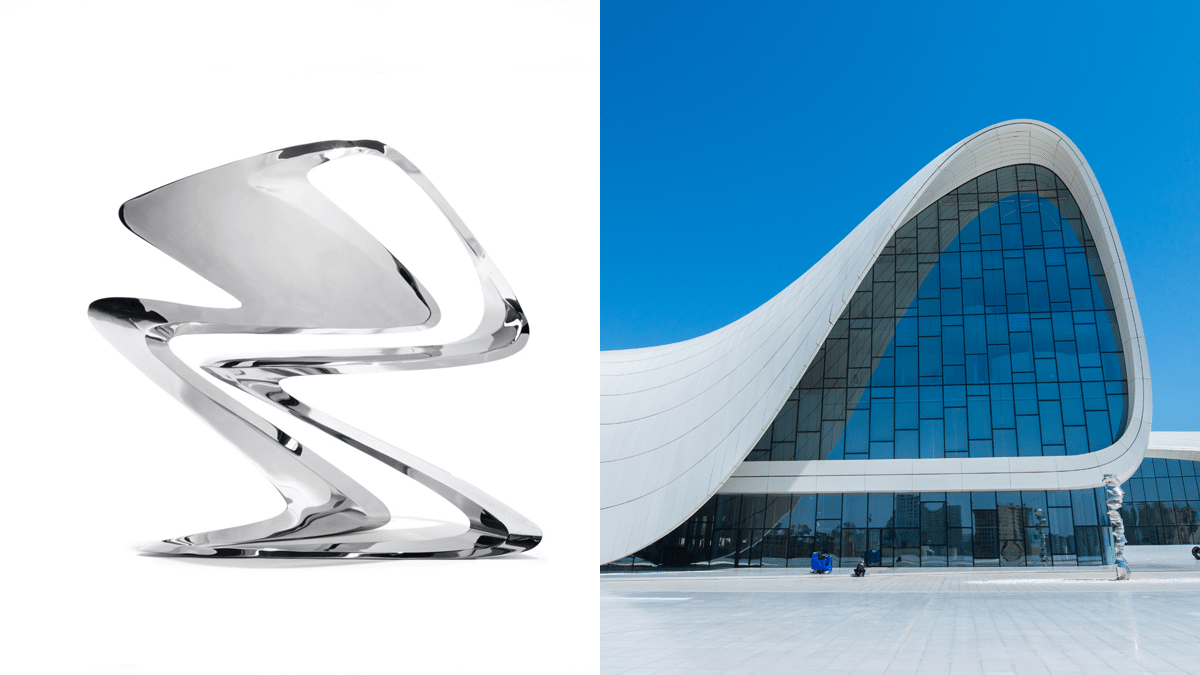
Left: Z-Chair (Photo: Zaha Hadid Architects) | Right: Heydar Aliyev Center (Photo: Stock Photos from Elnur/Shutterstock)
Are you familiar with the German word Gesamtkunstwerk? It’s defined as a “total art” or “a work of art that makes use of all or many art forms.” You might be wondering, does such art exist? The short answer is yes. Some of the most iconic pieces of architecture involve the creation of a total work of art considered on all scales. The happy result of this intention is a series of incredible furniture pieces that embody the intention of the larger building.
The possibility of a cohesive project designed by one person has interested many architects throughout time. Some architects have designed chairs in order to have total control of the finished work—as defined by the term gesamtkunstwerk, others have designed chairs simply for the sake of experimenting at a different scale. To fully appreciate architects’ attempts at creating gesmtkunstwerk, let’s explore some of the best and most famous chairs designed by architects and compare them to the architect’s buildings. Through studying their chairs, you may gain a better understanding of a master designer’s thought process. You may even find inspiration for a chair design of your own.
See how architects have taken inspiration from their most famous building designs to create unique chairs that are total works of art.
Alvar Aalto
Paimo Chair / Finlandia Hall
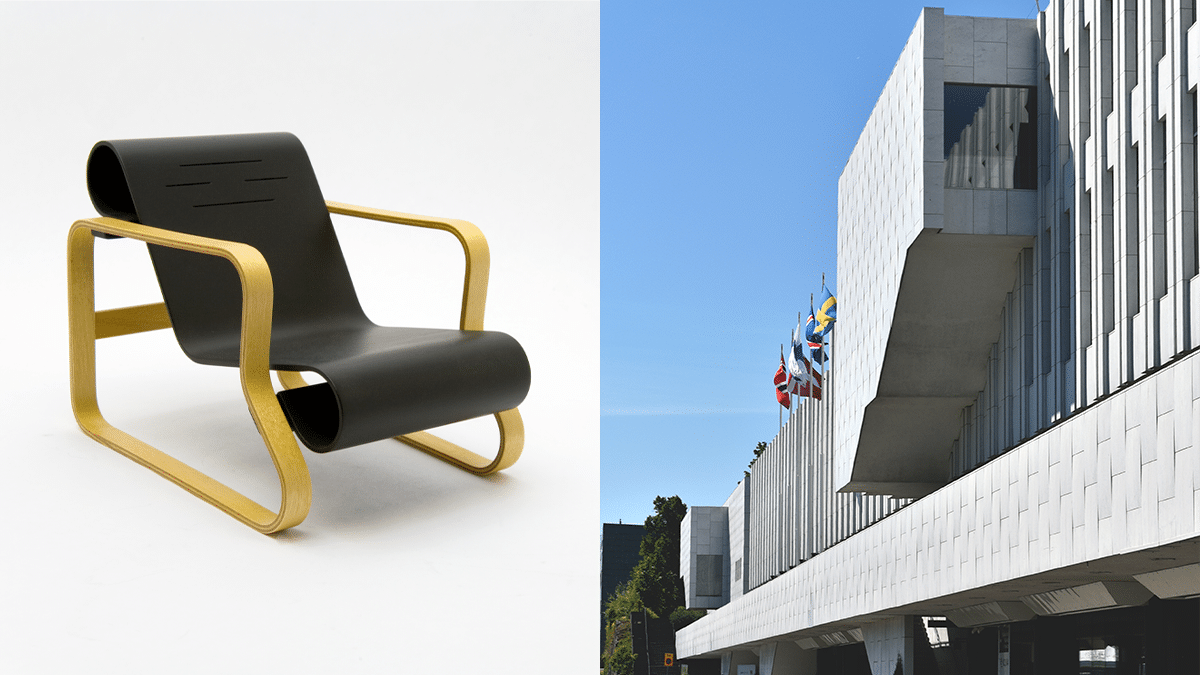
Left: Paimo Chair (Photo: Stock Photos from Thomas Hernandez/Shutterstock) | Right: Finlandia Hall (Photo: Stock Photos from RTYX/Shutterstock)
Hugo Alvar Henrik Aalto was a true “jack of all trades” designer. He was a Finnish architect who dabbled in design across many fields, including traditional art such as painting or sculpting and industrial design such as furniture and glassmaking. This all boiled down to Aalto’s belief that these design efforts were “branches of the tree whose trunk is architecture.”
Aalto’s Paimo Chair, or Chair 41, is the result of his sculptural experience and thus uses minimal plywood structure for an elegantly curved chair designed to help users breathe easier.
Charles and Ray Eames
Eames Chair / Eames Foundation
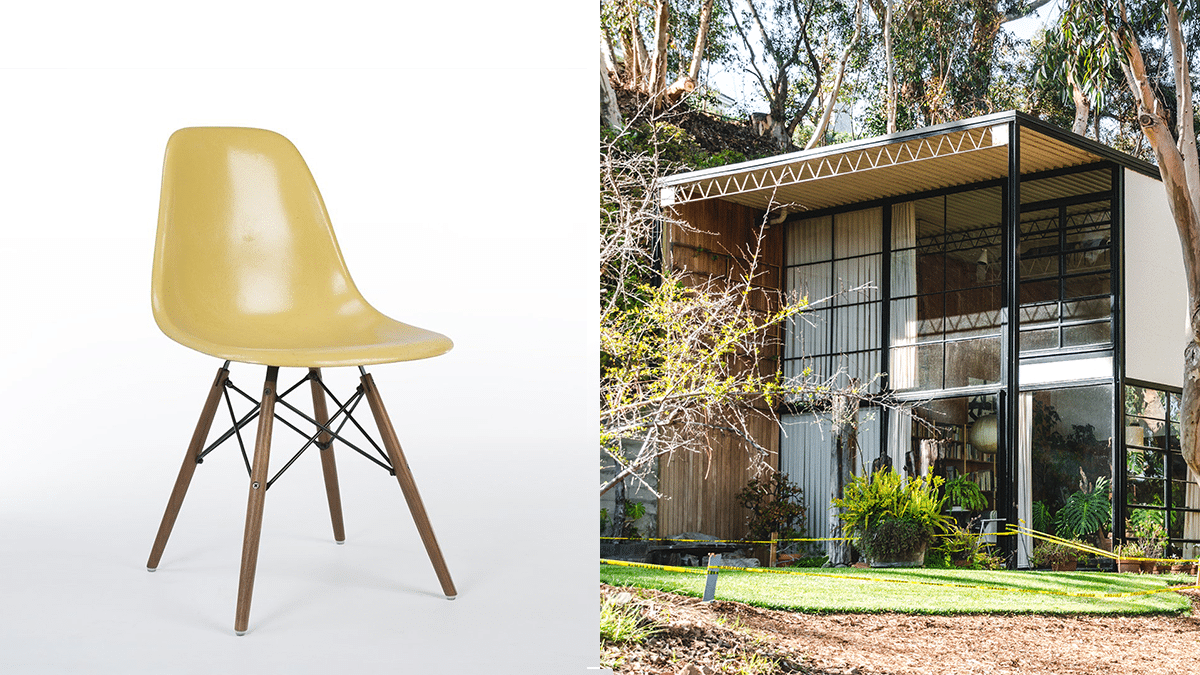
Left: Eames Chair (Photo: VNTG) | Right: The Eames Foundation (Photo: Stock Photos from Stephanie Braconnier/Shutterstock)
Perhaps the most famous chair on this list, the Eames Chair is available in a variety of styles. Charles and Ray Eames are a famous design couple who did not have a specific style, but used their natural curiosity to solve design problems in the simplest and most effective ways.
Their logical design process is evident in the iconic Eames Chair design that features minimal leg structure cross-braced structure with a simple shell as a seat. The Eames Foundation, originally designed as their home, features a similar careful logic that results in a minimal but beautiful work.
David Adjaye
Washington Skeleton / National Museum of African American History and Culture
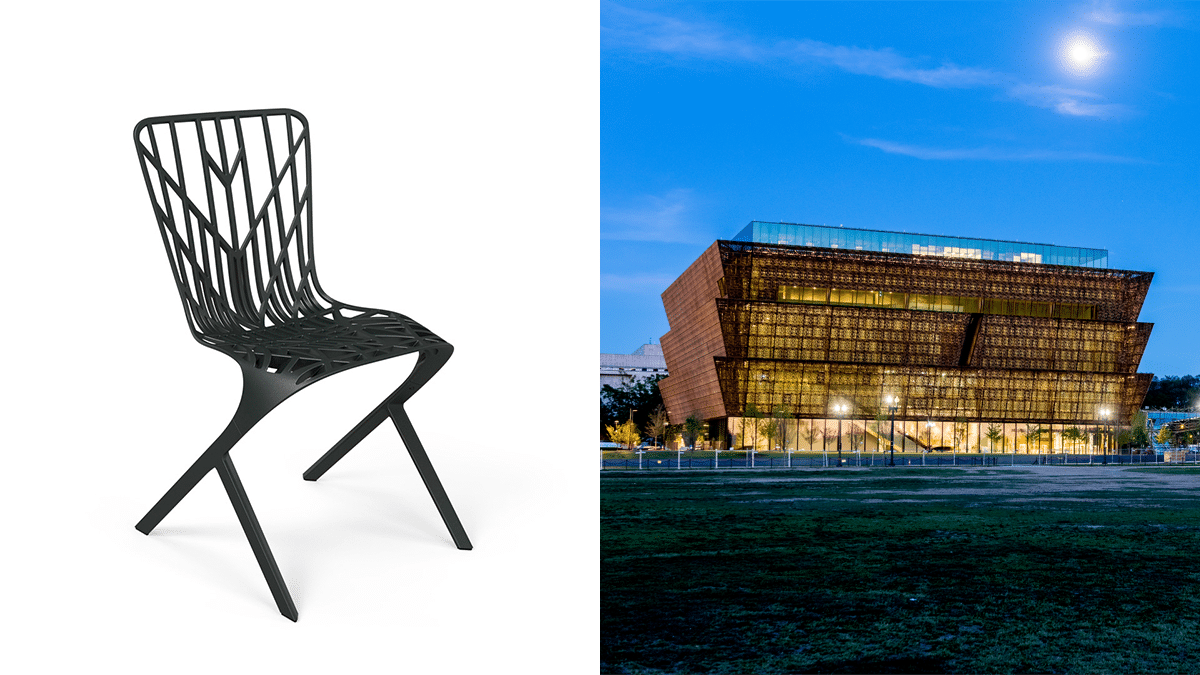
Left: Washington Skeleton (Photo: Knoll) | Right: National Museum of African American History and Culture (Photo: Stock Photos from BrianPlrwin/Shutterstock)
Sir David Adjaye’s Washington Skeleton Aluminum Side Chair is propped up by delicate legs that seamlessly blend from the chair’s seat. By comparing this chair with his built architectural projects, viewers may notice a study of texture and material evident in his work. The Skeleton Chair is compared here to the National Museum of African American History and Culture which uses intricate panels reminiscent of the chair’s patterning.
Denise Scott Brown & Robert Venturi
Queen Anne Side Chair / Children’s Museum of Houston
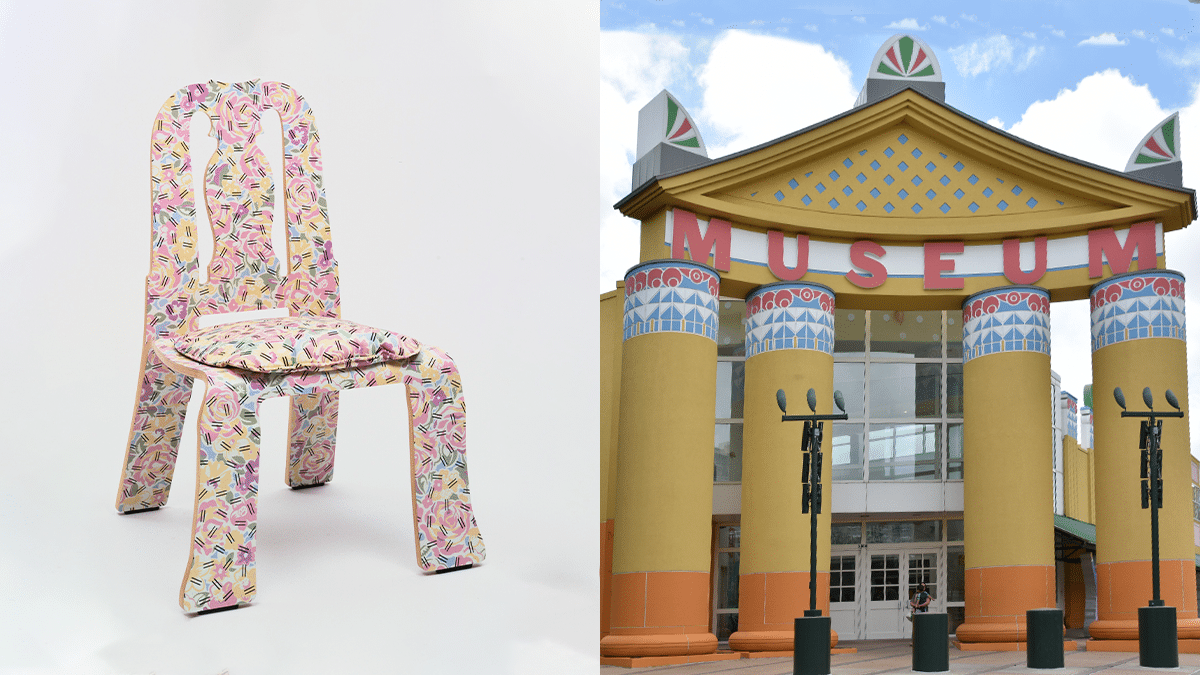
Left: Queen Anne Side Chair (Photo: MoMA) | Right: Children’s Museum of Houston (Photo: Stock Photos from Ritu Manoj Jethani/Shutterstock)
Both Robert Venturi and Denise Scott Brown were opposed to some modernist values that were popular during their career. Their built projects and written work—such as Learning from Las Vegas—helped create a postmodern shift in the fields of art and architecture. Postmodern influences can be seen in two examples of their famous and profoundly unique work, the Queen Anne Side Chair and the Children’s Museum of Houston.
Eero Saarinen
Tulip Chair / JFK Airport Interior
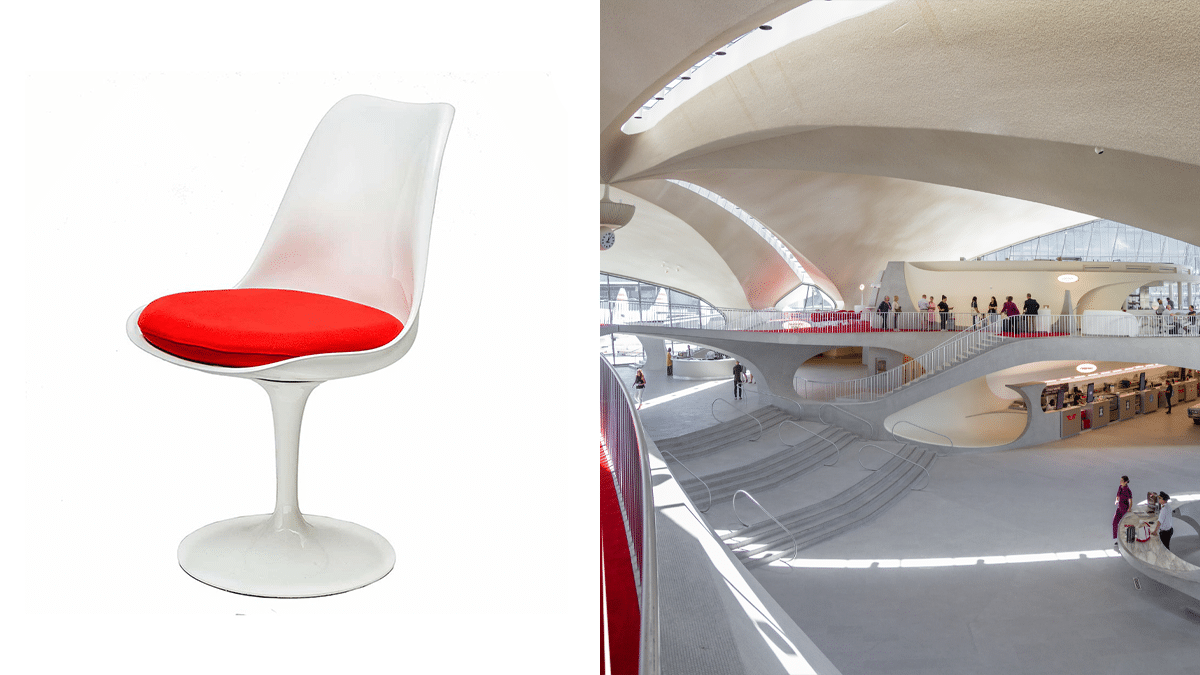
Left: Tulip Chair (Photo: Steel Form) | Right: JFK Airport Interior (Photo: Stock Photos from Wollertz/Shutterstock)
Saarinen’s Tulip Chair is one example in a collection of elegant modern furniture. Eero Saarinen’s collection of built works include impressive commissions such as the Gateway Arch, Washington Dulles, International Airport, and the TWA Flight Center at JFK Inernational Airport. All of these projects demonstrate his understanding of structure, which he tested using large-scale models that proved the stability of his sweeping concrete forms. These defining elegant contours are evident in the Tulip Chair.
Frank Gehry
Wiggle Chair / Dancing House
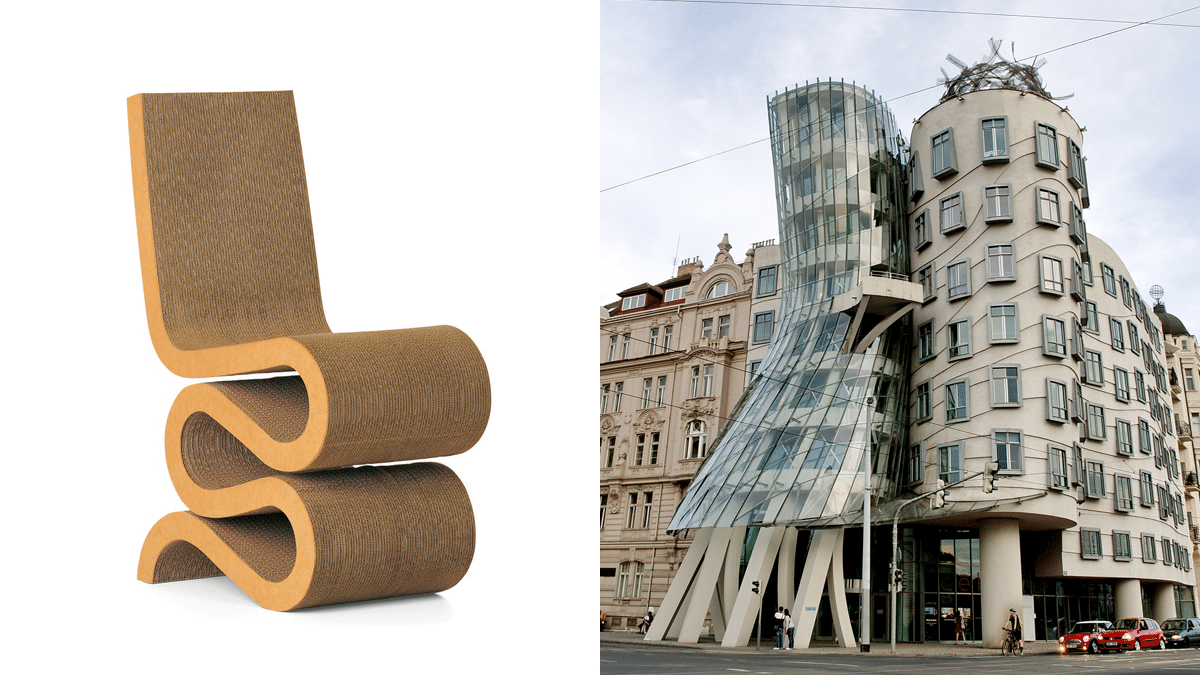
Left: Wiggle Chair (Photo: Hive Modern | Right: Dancing House (Photo: Stock Photos from andermShutterstock)
Pointing out a Frank Gehry project is typically a simple task, as his wild collection of bent sheets and forms are so well known. Frank Gehry’s Wiggle Chair is almost modest in comparison. The Dancing House in Prague shows clear similarities to the playful form of the Wiggle Chair and both are great examples of Gehry’s mastery of composition and form.
Frank Lloyd Wright
Robie 1 Chair / Fallingwater
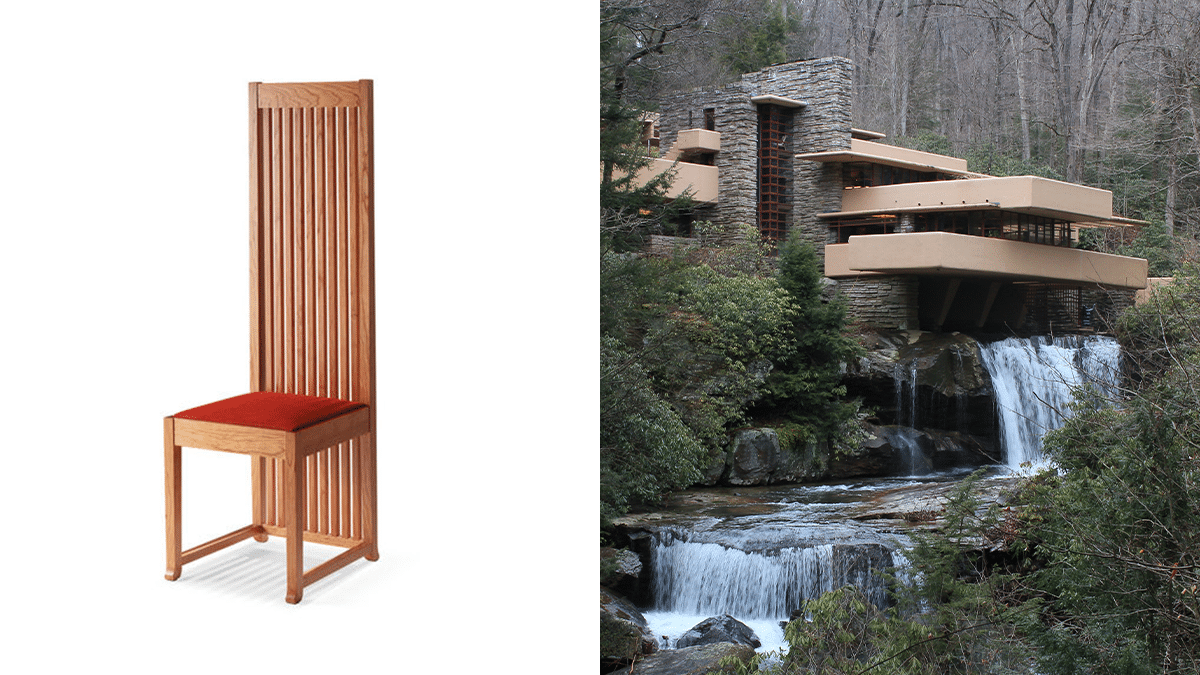
Left: Robie 1 Chair (Photo: Classicdesign.it) | Right: Fallingwater (Photo: Stock Photos from Jim Packett/Shutterstock)
Frank Lloyd Wright’s portfolio of work boasts one of the most famous pieces of American architecture—Fallingwater. He was a pioneer of concrete construction and defined a style for modern American homes. Frank Lloyd Wright also played with a shifting of horizontal and vertical planes, as is visible in the composition of Fallingwater. The Robie Chair, with its unusually tall backboard that extends all the way to the ground, seems to follow a similar design logic.
Gerrit Rietveld
Red and Blue Chair / The Schroder House
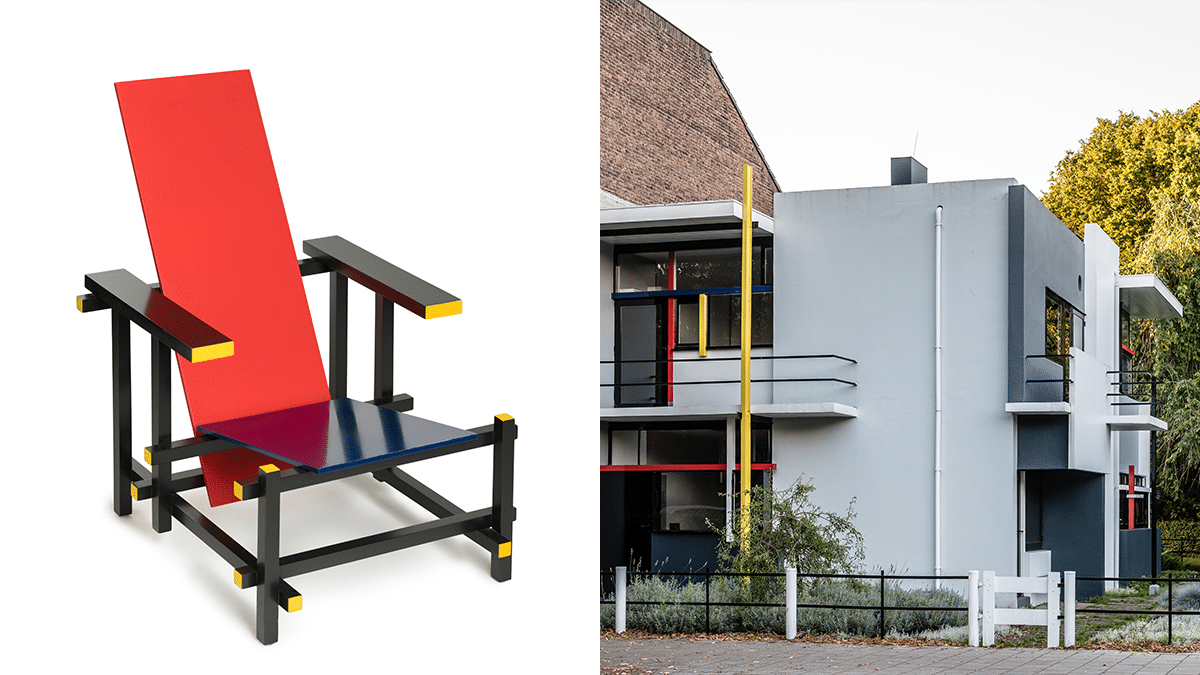
Left: Red and Blue Chair (Photo: Stock Photos from Picture Partners/Shutterstock) | Right: The Schroder House (Photo: Stock Photos from JJFarq/Shutterstock)
Gerrit Rietveld’s comparison of chair and building is perhaps the most obvious connection between the two styles. His work is also one of the best examples of the De Stijl, or “the style” movement which focused on primary colors and basic forms pushed and pulled in 3D space. Paintings by Mondrian are also a great example of the De Stijl movement.
Kazuyo Sejima
Drop Chair / Sumida Hokusai Museum
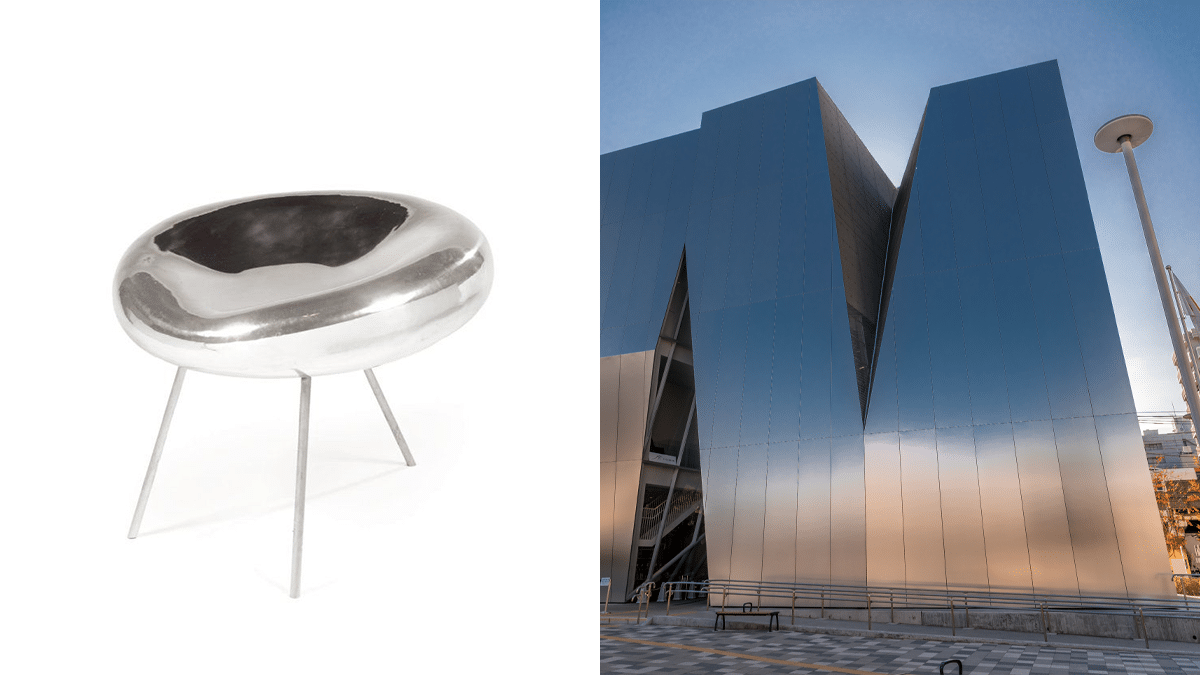
Left: Drop Chair (Photo: Koller International Auctions) | Right: Sumida Hokusai Museum (Photo: Stock Photos from Manuel Ascanio/Shutterstock)
Kazuyo Sejima is the co-founder of SANAA and a world-renowned modernist architect. Common characteristics found throughout her work are the use of clean forms such as squares and cubes and the use of shiny metals. The latter design principle is clear in both the Drop Chair and the Sumida Hokusai Museum.
Le Corbusier
Le Corbusier Chair / Notre Dame du Haut at Ronchamp
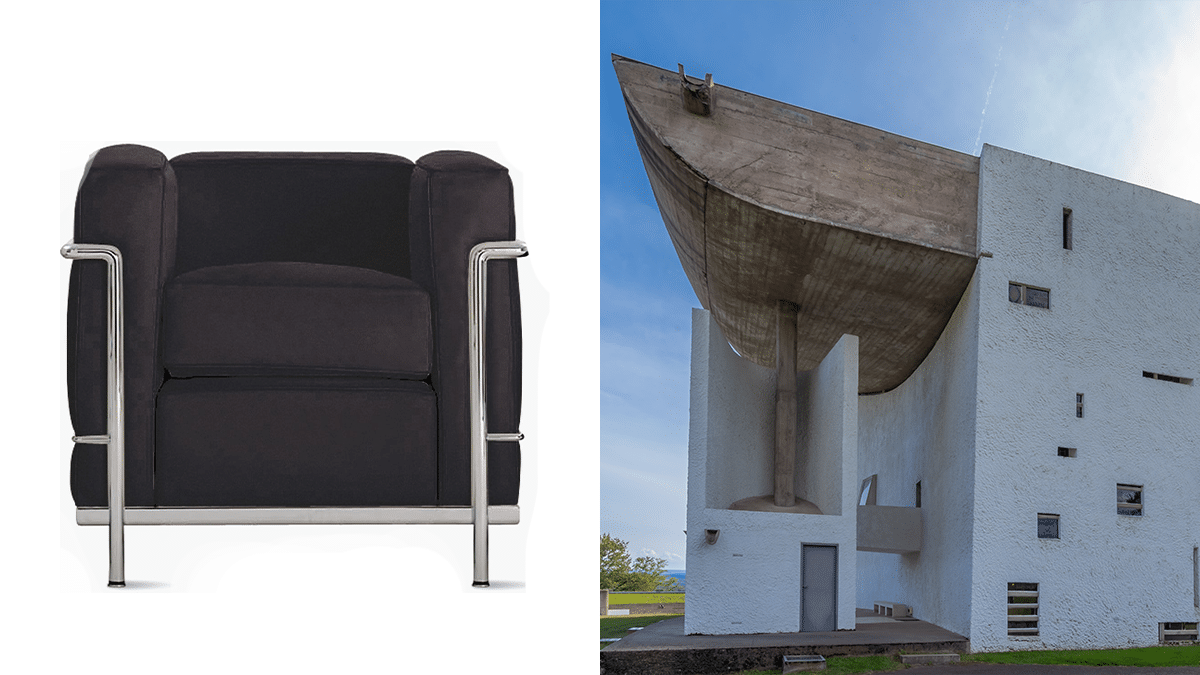
Left: Le Corbusier Chair LC2 Petit Modele Armchair (Photo: Design Within Reach) | Right: Notre Dame du Haut at Ronchamp (Photo: Stock Photos from Franck Legros/Shutterstock)
Charles-Édouard Jeanneret—famously known as Le Corbusier—was one of the fathers of modernism in architecture. His work focused on a belief of function as the driver for design that should be expressed through beautiful but simple gestures. This idea is clear in his armchair design which uses minimal intervention to create the seat, but reinforces line with pronounced structure.
Lina Bo Bardi
Bowl Chair / Art Museum of São Paulo
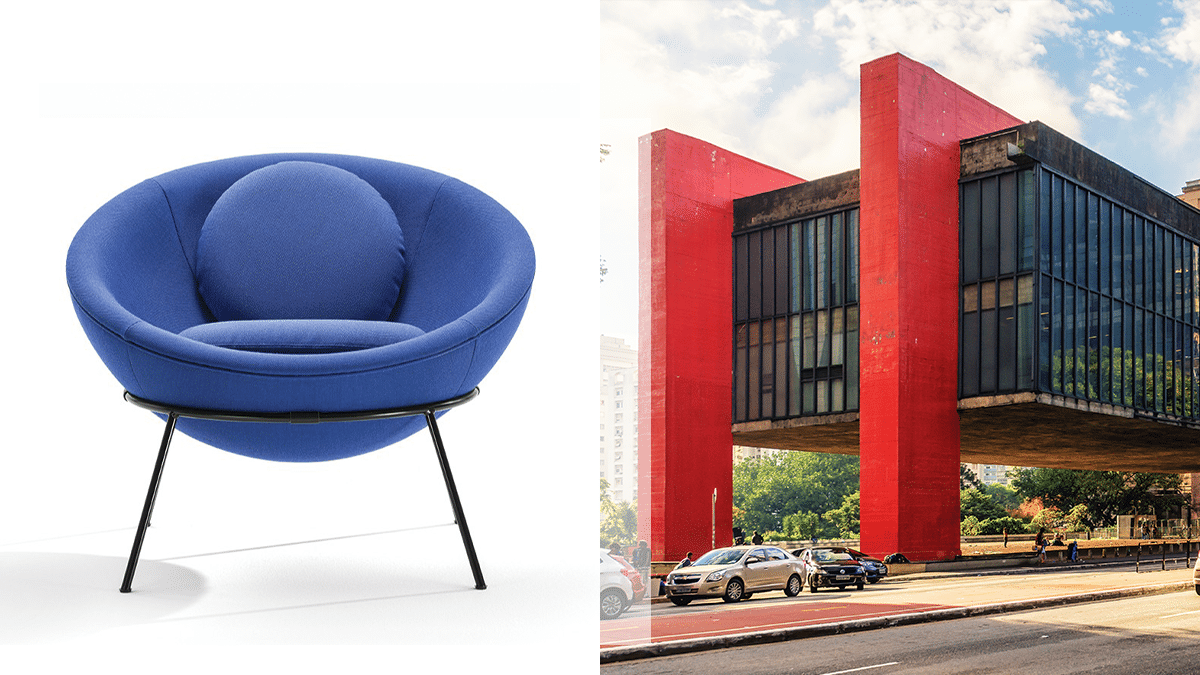
Left: Bowl Chair (Photo: Archiproducts) | Right: Art Museum of São Paulo (Photo: Stock Photos from Antonio Salaverry/Shutterstock)
Brazilian modernist Lina Bo Bardi is famous for her public architecture projects, namely the Art Museum of São Paulo. Her work includes the use of simple geometry and bold color influenced by the Brazilian culture that she designed for. Bo Bardi’s Bowl Chair represents both of these important characteristics and effortlessly meets these design principles on a much smaller scale.
Louis Kahn
Spindle Chair / Salk Institute
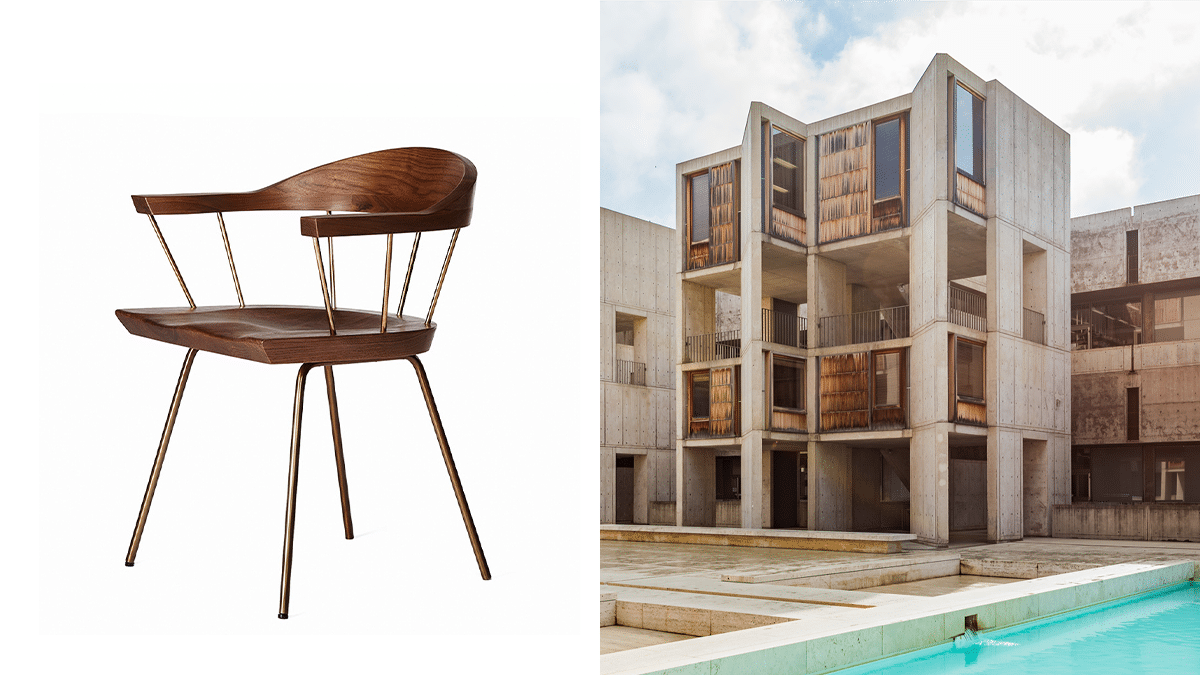
Left: Spindle Chair (Photo: Suite NY) | Right: Salk Institute (Photo: Stock Photos from Andriy Blokhin/Shutterstock)
Though this chair may not at first glance seem to relate to the geometric simplicity of Louis Kahn’s famous architecture, Kahn used spindle chairs extensively throughout his work. This makes sense when considering that his architecture featured the use of minimal geometry used in dramatic ways, such as the simplicity of the Salk Institute. These designs were informed by a purity and utility that defined Louis Kahn’s architecture.
Ludwig Mies van der Rohe
Barcelona Chair / Barcelona Pavilion
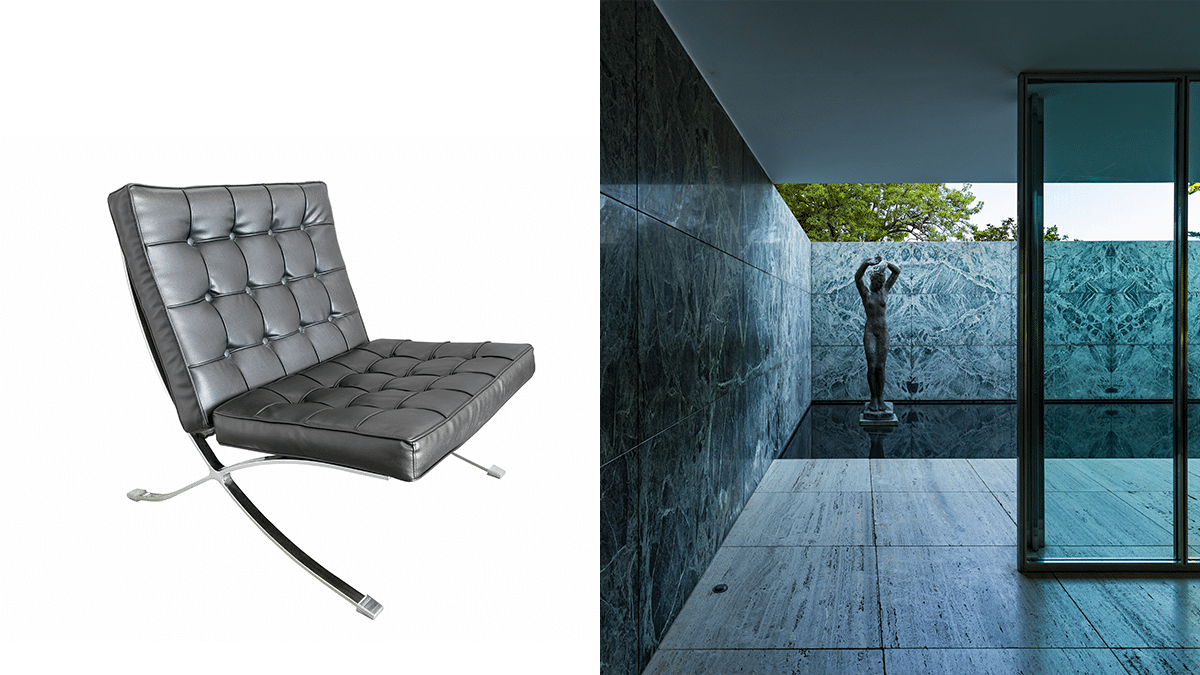
Left: Barcelona Chair (Photo: Stock Photos) from lightrain/Shutterstock) | Right: Barcelona Pavilion (Stock Photos from kentaylordesign/Shutterstock)
Ludwig Mies van der Rohe, often called LMVDR or simply Mies, was another father of modernism in architecture. He is often quoted with the phrase “less is more,” which is usually evident in his architecture. Though fiercely against ornamentation or decoration, Mies attempted to use the actual architecture and structure of a building to act as the decoration, such as the I-beams he frequently left revealed in interior spaces.
It is important to note that Mies designed the Barcelona Chair in partnership with Lilly Reich. This furniture piece was designed for its showcase in the famed Barcelona Pavilion.
Marcel Breuer
Wassily Chair / The Met Breuer
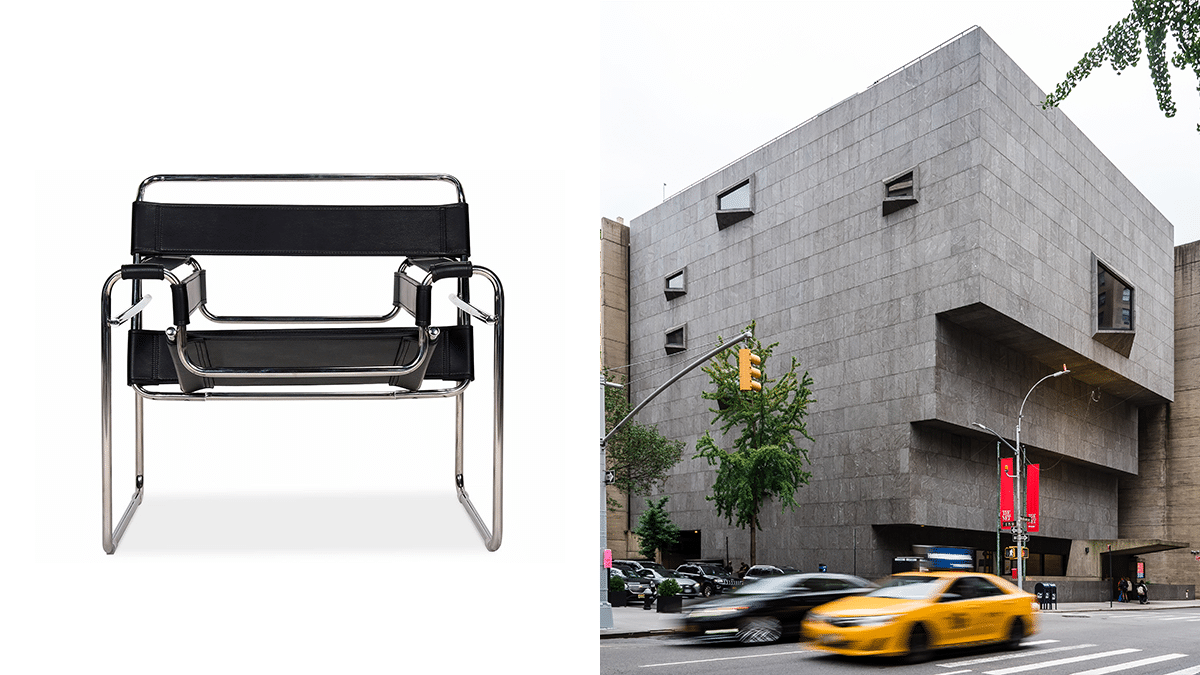
Left: Wassily Chair (Photo: Interior Icons) | Right: The Met Breuer, named in honor of the architect (Photo: Stock Photos from JJFarq/Shutterstock)
Marcel Breuer is well known for his Wassily Chair, which seems to act as a composition of lines and surfaces. This approach may seem similar to that of Gerrit Rietveld, whose chair and architecture are also included on this list. Both architects were inspired by De Stijl ideology that attempted to break design down to its basic components. Breuer’s Met Museum, later renamed in his honor, also features the De Stijl characteristics that were commonly found in architecture of the time.
Oscar Niemeyer
Rio Rocking Chair / Niterói Contemporary Art Museum
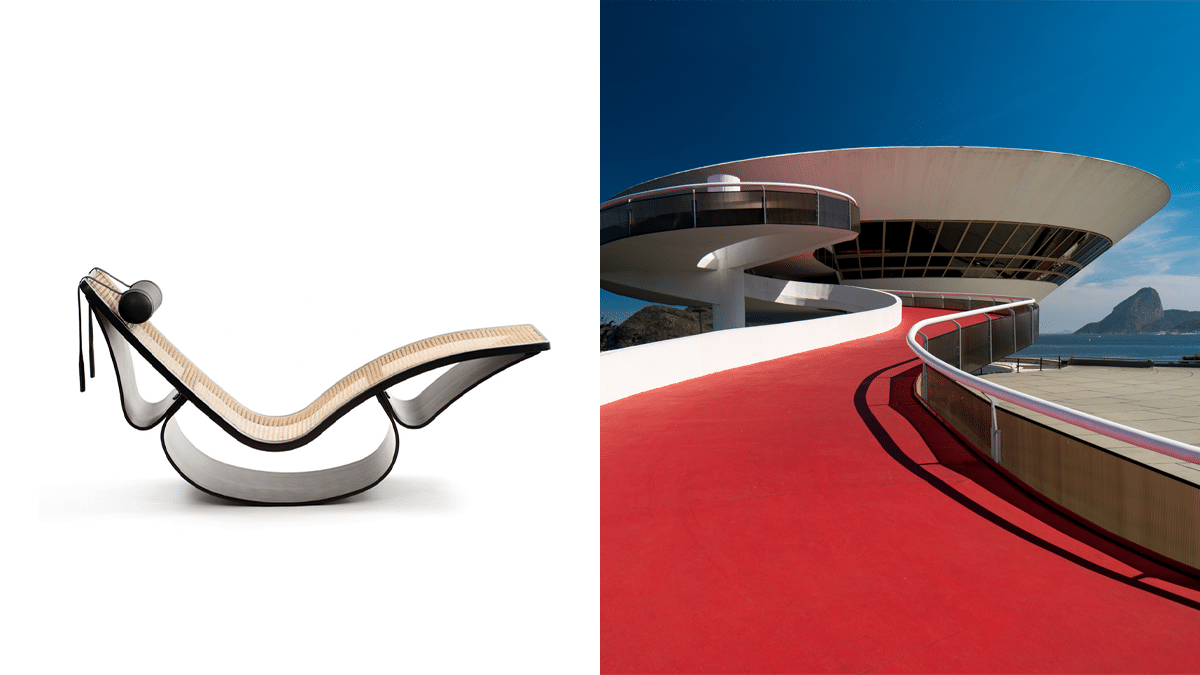
Left: Rio Rocking Chair (Photo: Espasso) | Right: Niterói Contemporary Art Museum (Photo: Stock Photos from Donatas Dabravolskas/Shutterstock)
Oscar Niemeyer is another famous Brazilian modernist. He is famous for his profound influence on the city of Brasilia through projects of federal public buildings and for his use of bold uncompromising form. His Rio Rocking Chair reimagines basic form and structure in a way that perfectly matches the unusual design approach found in his buildings.
Peter Zumthor
Chaise Lounge / Therme Vals
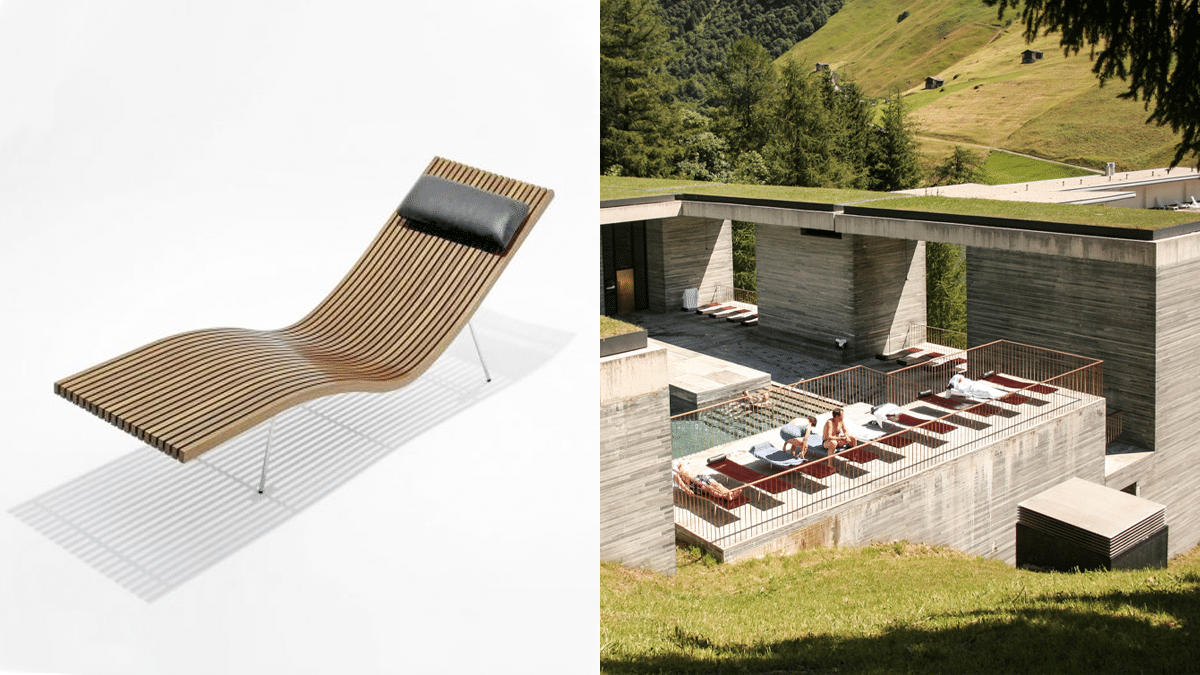
Left: Chaise Lounge (Photo: Pamono) | Right: Therme Vals (Photo: Stock Photos from lauravr/Shutterstock)
Peter Zumthor is a minimalist Swiss architect with a mastery of materials. Therme Vals, one of Zumthor’s most famous projects, includes heavy stone walls to form thermal baths. The entire structure is carved into the landscape and integrated into the natural world. The interior of Therme Vals creates a healing and spiritual space, one that is present in Zumthor’s elegantly curved Chaise Lounge.
Santiago Calatrava
Calatrava Chair and Stool / The Oculus
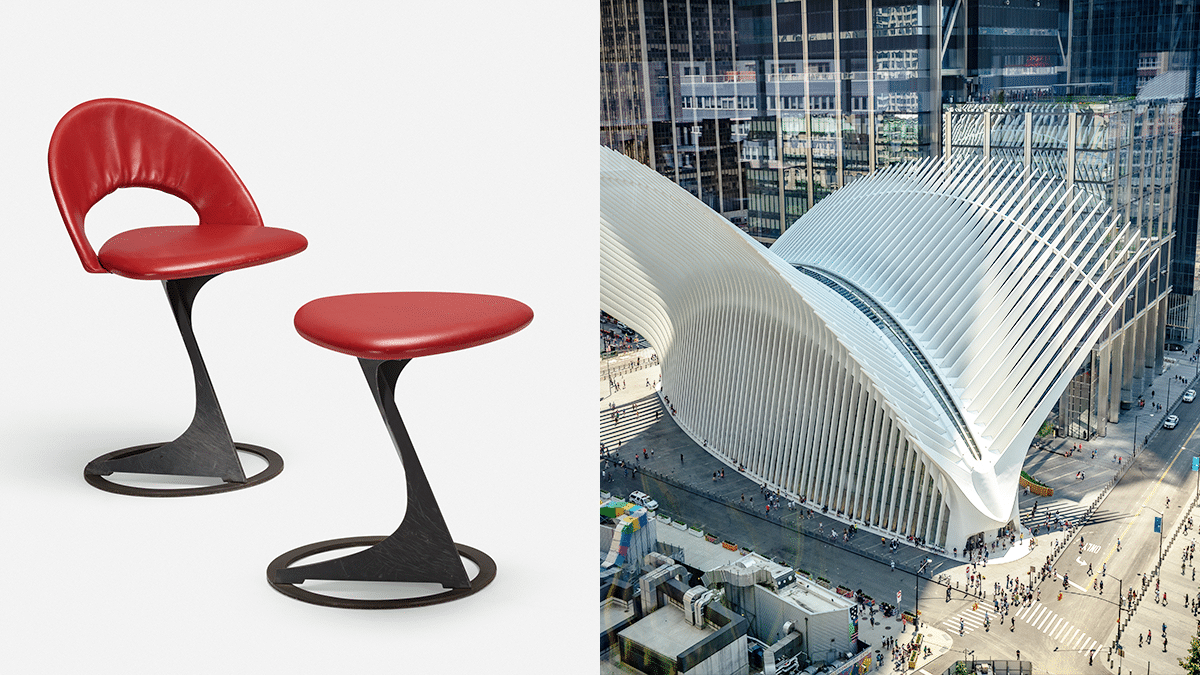
Left: Calatrava Chair and Stool from the Tabourettli Theatre (Photo: Wright) | Right: The Oculus (Photo: Stock Photos from Alex Cimbal/Shutterstock)
Santiago Calatrava is well known for his futuristic structures that often take on forms reminiscent of soaring birds. The Oculus in New York City is a perfect example of these wild gestures. In his chair and stool, Calatrava uses a similar sculptural identity to craft the base, creating a set that appears to challenge gravity, as achieved in many of his architectural projects.
Tadao Ando
Dream Chair / Church of Light
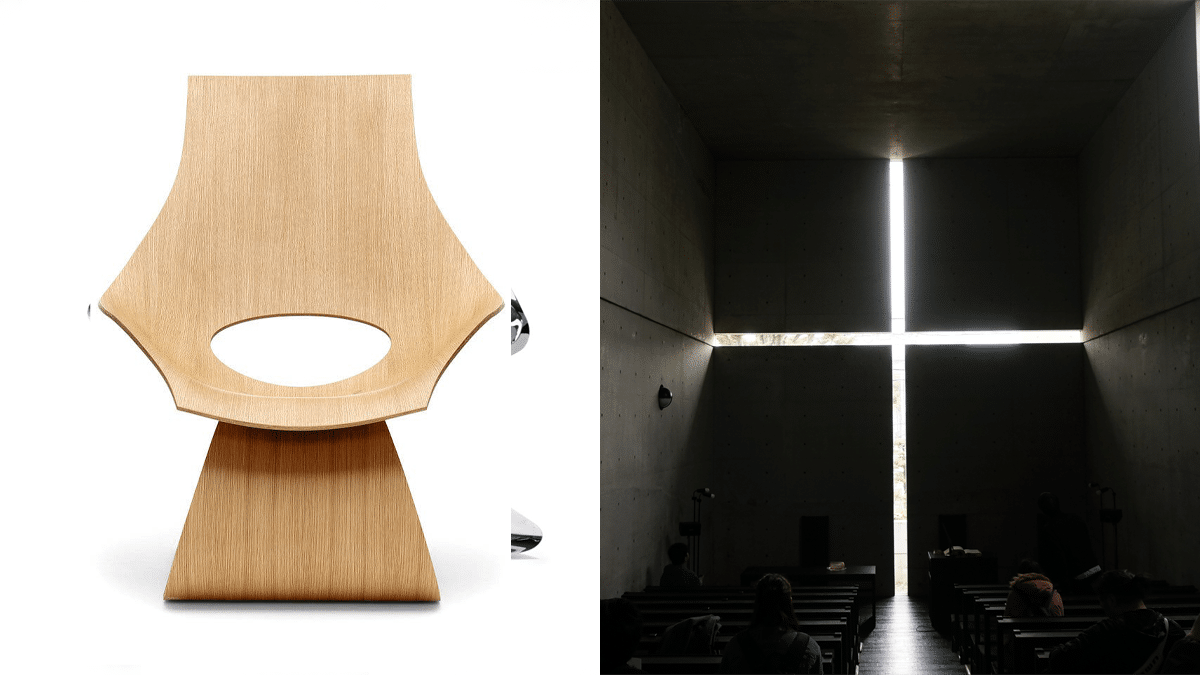
Left: Dream Chair (Photo: Carl Hansen & Søn) | Right: Church of Light (Photo: Stock Photos from isaray/Shutterstock)
Tadao Ando’s Church of Light is a perfect example of his architectural style. He typically uses natural forces such as light and wind to craft spaces while physical elements support them—in this example, the minimal concrete allows for light to create the symbol of a cross. True to this approach, the Dream Chair is designed as a chair made from the minimal intervention needed to transform the wood into the correct form for seating. It is also designed to be visually pleasing from all angles through its gentle curvature.
Walter Gropius
F51 Chair / Bauhaus School Building

Left: F51 Chair (Photo: Architonic) | Right: Bauhaus School Building (Photo: Stock Photos from berlinpictures16/Shutterstock)
Famous for his role as the founder of the Bauhaus, Walter Gropius was one of the fathers of modernism and the famed “International Style.” It is a well-known anecdote that Gropius had no drawing skills, which was more important in the field of architecture at the time than it is today. He is often referred to as the “ideas man.” The rigid teachings of the International Style can be noticed both in the famed architecture of the Bauhaus and in the F51 Chair designed by Walter Gropius.
Zaha Hadid
Z-Chair / Heydar Aliyev Center

Left: Z-Chair (Photo: Zaha Hadid Architects) | Right: Heydar Aliyev Center (Photo: Stock Photos from Elnur/Shutterstock)
The similarities between Z-Chair and Hadid’s other work is clear. Both utilize the parametric logic that earned Zaha Hadid her global fame. Like much of her other work, the Z-chair abstracts a simple gesture that captures the basic function needed and develops a unique and elegant form without sacrificing its utility. This may be most similar to the Heydar Aliyev Center which has become an iconic example of Hadid’s revolutionary parametric architecture.
